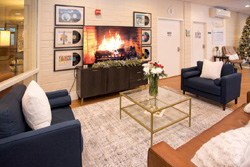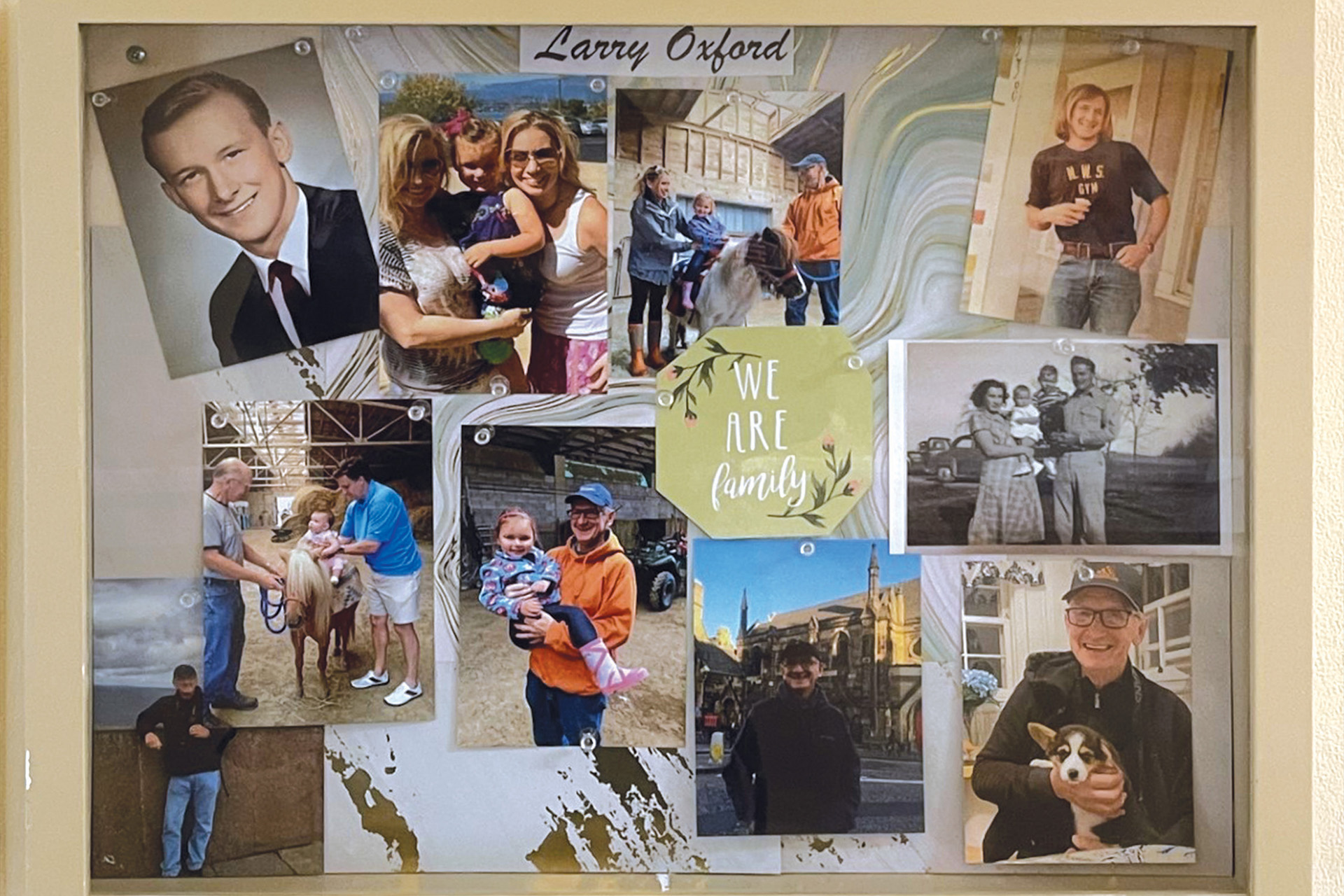
A COMPASSIONATE COMMUNITY FOR EVERY JOURNEY WITH DEMENTIA
INSIGHT: How does a residential community benefit those with various forms of dementia?
Quick Answer: It provides a secure, adaptable environment with specialized staff trained to support a wide spectrum of cognitive and behavioral needs.
Expert Recap: Specialized residential care enhances safety, provides tailored engagement, and improves quality of life for individuals, no matter the type of dementia they are facing.
SUMMARY:
At Windchime of Marin, we provide a premier memory care community dedicated to serving individuals living with any form of dementia. While many are familiar with Alzheimer's, it is just one condition under the broader umbrella of dementia—a term describing a decline in cognitive function that impacts daily life. Each type of dementia is progressive and presents its own unique set of challenges and symptoms. (1) With this understanding, our purpose-built community, highly-trained 24/7 staff, and enriching programs are all designed to support the distinct needs of every resident. We are committed to preserving dignity and promoting engagement through our Vibrant Life® program and our exceptional Elevate® dining experience, offering families true peace of mind.
- Windchime of Marin Philosophy: We believe individuals with dementia flourish in a structured, yet vibrant community that offers security, social interaction, and a sense of purpose, creating a true home that adapts to their changing needs.
- Specialized Dementia Care: Our services include personalized care plans for advanced disease stages, 24/7 on-site staff specially trained in memory care, and a secure, thoughtfully designed residential setting.
- Emphasis on Engagement: Our Vibrant Life® program provides daily opportunities for tailored cognitive and social connection, while our Elevate® dining program ensures a dignified and enjoyable culinary experience, enhancing overall well-being for every resident.
WINDCHIME OF MARIN SERVICE AREA
Specialized Residential Dementia Care for Marin County and the surrounding Bay Area.
THE FAMILY JOURNEY: NAVIGATING A DEMENTIA DIAGNOSIS
Receiving a dementia diagnosis introduces a period of profound change and uncertainty for the entire family. Unlike other conditions, a dementia diagnosis opens the door to many questions about the specific type, the progression of symptoms, and how to provide the best possible care. As cognitive abilities shift, the world can become disorienting, making the need for a secure, stable, and expert-led environment more critical than ever.
This is the core of our mission at Windchime of Marin. We have cultivated a community that acts as a sanctuary—a place where residents are not just cared for, but are deeply understood, respected, and empowered to live a meaningful life, whatever their specific diagnosis may be.
We understand that moving a loved one into a residential community is a significant decision. The demands of providing 24-hour supervision and specialized engagement for conditions as diverse as Lewy Body or Frontotemporal dementia can be a heavy weight for families to carry. Allow Windchime of Marin to be your partner, offering a purpose-built setting where your loved one will receive the expert care and compassion they deserve, alleviating the stress on your family.
As a trusted partner for families throughout Marin County, we have seen firsthand how our specialized residential community can transform the lives of those with dementia. It is about more than assistance; it is about providing a safe and vibrant home that preserves dignity, fosters connection, and ensures your loved one can live their life to the fullest.
UNDERSTANDING THE SPECTRUM OF DEMENTIA
Effective dementia care requires a specialized approach that honors the unique challenges of each type. At Windchime of Marin, our memory care services are built on a foundation of comprehensive, person-centered support that addresses this entire spectrum. While Alzheimer's disease is the most frequent diagnosis, accounting for 60-80% of cases, other forms of dementia require distinct care strategies and considerations.Vascular Dementia
- Cause & Characteristics: This form of dementia is caused by conditions that damage blood vessels in the brain, reducing blood flow and depriving brain cells of oxygen and nutrients. It can occur after a major stroke or through a series of smaller, often unnoticed strokes. Symptoms can appear suddenly and progress in a "step-like" pattern, where abilities remain stable for a time and then decline. Challenges often include slowed thinking, difficulty with planning and concentration, and mood changes like depression or apathy. (3)
- Special Care Concerns: Care focuses on preventing further strokes by managing cardiovascular risk factors. At Windchime, our 24/7 staff supports medication management for blood pressure and cholesterol, while our Elevate® dining program provides heart-healthy meal options. Our structured, low-stress environment helps manage the confusion and anxiety that can accompany vascular dementia.
Lewy Body Dementia (LBD)
- Cause & Characteristics: LBD is caused by abnormal protein deposits, called Lewy bodies, that form in nerve cells in the brain. These deposits disrupt normal brain function. Hallmarks of LBD include significant fluctuations in alertness and attention, recurrent and detailed visual hallucinations, and Parkinson's-like movement symptoms such as rigidity and tremors. REM sleep behavior disorder, where individuals act out their dreams, is also very common. (4)
- Special Care Concerns: LBD requires a delicate care balance. Medications for movement symptoms can sometimes worsen hallucinations or confusion. Our staff is specially trained to recognize and respond to these complex symptoms, using non-pharmacological approaches first, such as modifying the environment to reduce triggers for hallucinations and providing reassurance. Consistency and routine are key, which our community life provides.
Frontotemporal Dementia (FTD)
-
Cause & Characteristics: FTD results from damage to neurons in the frontal and temporal lobes of the brain. It often occurs at a younger age than other dementias (typically between 45-64). The primary symptoms are dramatic changes in personality and behavior or language problems. A person with FTD might become impulsive, act inappropriately in social situations, lose empathy, or develop compulsive behaviors. Others may lose the ability to speak or understand language. Memory often remains intact in the early stages. (5)
-
Special Care Concerns: Managing FTD requires a high degree of patience and specialized behavioral strategies. Our staff is trained to not argue with or correct a resident, but rather to redirect and provide a structured, calm environment. The social engagement offered by our Vibrant Life® program is adapted to be supportive without being overwhelming, helping residents maintain connections in a way that feels safe.
NEARBY ATTRACTIONS AND SERVICES FOR DAY OUTINGS
For over 20 years, our family-owned and operated community has provided a boutique-style memory care experience, deeply integrated with the local Marin County culture. Our central location allows for managed and appropriate outings that provide joy and connection for our residents.
ENHANCING LIFE QUALITY ACROSS THE DEMENTIA SPECTRUM
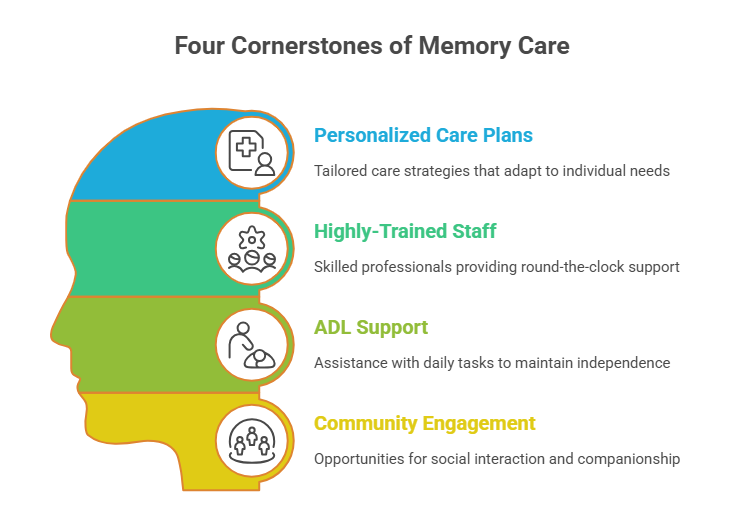
1. PERSONALIZED AND EVOLVING CARE PLANS
Dementia is not a static condition. We create a customized care plan for each resident that is both structured and flexible, adapting as their specific needs evolve. This plan becomes a living document, guiding our caregivers in providing consistent and relevant care for any type of dementia.
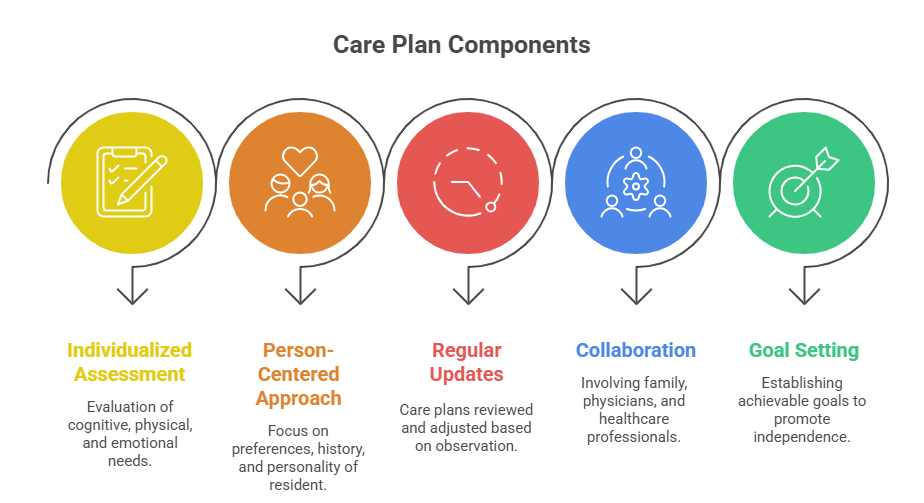
- Initial Assessment: We conduct a comprehensive evaluation upon move-in, involving the resident, family, and medical providers to understand their history, preferences, and current abilities.
- Collaborative Goal Setting: We work with families to establish meaningful goals that focus on maintaining skills, promoting joy, and ensuring safety.
- Regular Reviews: Care plans are reviewed on a consistent schedule and updated whenever there is a change in a resident’s condition, ensuring care is always relevant.
- Tailored to Specific Dementia: Plans account for the unique symptoms of different dementias, such as creating visual cues for those with language-variant FTD or establishing calming routines for those with LBD.
2. HIGHLY-TRAINED, 24/7 ON-SITE STAFF
Our team is not only rigorously vetted but also specially trained in the full spectrum of dementia care. This comprehensive training covers communication strategies for language difficulties (FTD), compassionate management of behavioral symptoms like hallucinations (LBD), and creating a safe environment to prevent falls related to mobility issues (Vascular, LBD).
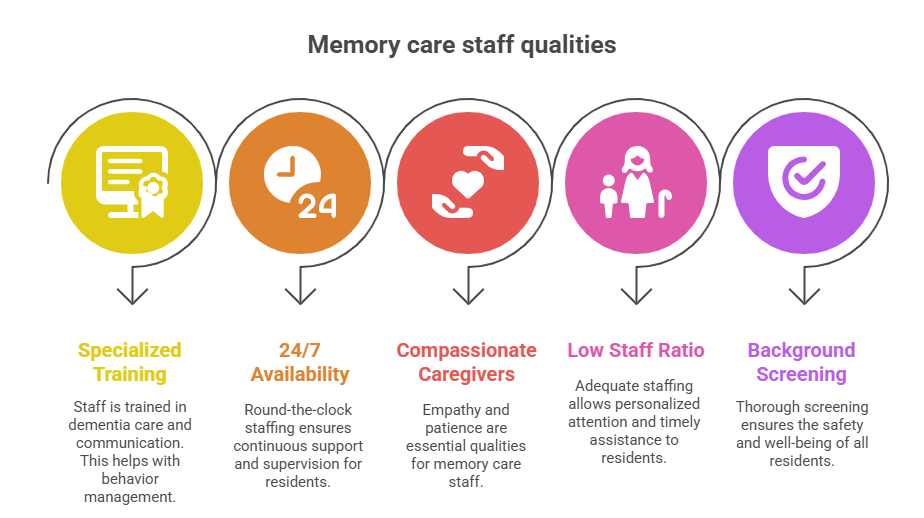
- Advanced Dementia Training: All care partners receive ongoing, certified training in the latest dementia care techniques.
- Behavioral Support Strategies: Staff learns de-escalation techniques and positive redirection to compassionately manage challenging behaviors without confrontation.
- Person-Centered Care Philosophy: Training is rooted in our "Tune Into Me" program, focusing on understanding each resident as an individual to anticipate their needs and preferences.
- Emergency Preparedness: Our team is trained to respond quickly and effectively to medical emergencies, a critical component of care for residents with complex health needs.
3. SUPPORT WITH ACTIVITIES OF DAILY LIVING (ADLS)
Our caregivers provide hands-on support to ease the daily challenges of living with dementia. This includes medication management tailored to complex needs, mobility support, and assistance with personal care that always protects our residents' dignity.
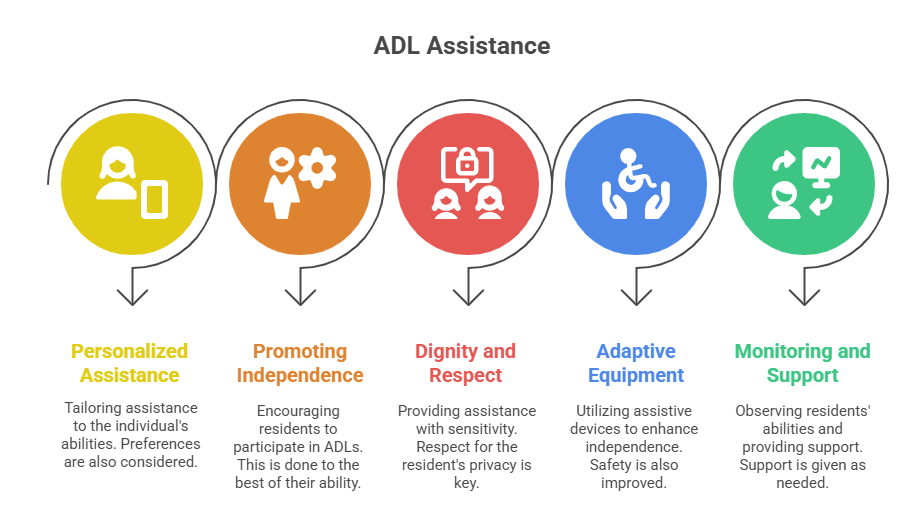
- Dignified Personal Care: Assistance with bathing, dressing, grooming, and incontinence care is provided discreetly and respectfully.
- Mobility and Transfer Assistance: We help residents move safely throughout the community, reducing the risk of falls and encouraging physical activity.
- Medication Management: Our trained staff ensures medications are administered correctly and on time, coordinating with physicians and pharmacies.
- Dining Support: Staff provides gentle encouragement and hands-on assistance during meals to ensure proper nutrition and hydration in a social setting.
4. COMMUNITY, COMPANIONSHIP, AND ENGAGEMENT
Our Vibrant Life® program is central to life at Windchime, offering a calendar full of activities that can be adapted to different cognitive and physical abilities, bringing joy and a sense of purpose to every resident.
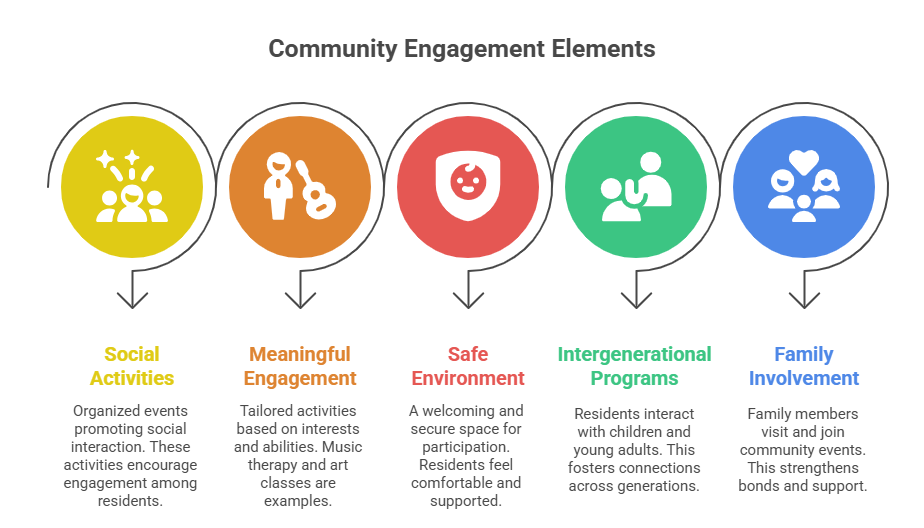
- Tailored Activities: Our calendar includes a mix of group activities that foster social bonds and one-on-one engagements for more personalized interaction.
- Cognitive Stimulation: We offer activities designed to engage the mind, such as music therapy, art, memory games, and storytelling, adapted for various ability levels.
- Family Integration: We host regular family events and encourage visits to maintain and strengthen the vital connection between residents and their loved ones.
- Sense of Purpose: Residents are encouraged to participate in simple, familiar tasks like folding laundry or setting tables, which can provide a profound sense of purpose and accomplishment.
THE WINDCHIME OF MARIN DIFFERENCE: A PARTNER YOU CAN TRUST
Navigating the path of dementia care is challenging. Our commitment to families in Marin County is built on three core principles that guide every aspect of our community.
- Experience and Trust:
- With over two decades of dedicated service, we have the experience to handle complex care situations with professionalism and grace.
- As a family-owned and operated community, we build lasting relationships based on transparency and trust.
- A Resident-Centered Approach:
- We are not a faceless corporation; our leadership team is accessible, responsive, and committed to providing peace of mind.
- Our "Daily Journey" program ensures that care revolves around the resident's lifelong patterns and preferences, not a rigid institutional schedule.
- A Focus on Quality of Life:
- We believe that a dementia diagnosis does not mean an end to joy and purpose.
- Our commitment to vibrant living is reflected in everything we do, from our thoughtfully designed floor plans and community spaces to our enriching daily programs.
IS WINDCHIME OF MARIN THE RIGHT CHOICE FOR YOUR LOVED ONE?
Take Our Quiz To Help You Decide:
TAKE THE NEXT STEP WITH CONFIDENCE
Choosing a residential community is a choice for safety, engagement, and an enhanced quality of life. If you are caring for a loved one with any form of dementia in Marin County or the surrounding Bay Area, you don't have to do it alone. Contact Windchime of Marin today for a complimentary, no-obligation consultation and tour.
OTHER SERVICES WE OFFER AT WINDCHIME OF MARIN
A THRIVING COMMUNITY
Our memory care residential community for Alzheimer’s patients provides comfortable residential units, gourmet dining room, and a Vibrant Life® program offering a full of range activities that bring joy and purpose to our residents.
MEMORY CARE
Our comprehensive memory care community and services are designed for residents with various forms of Alzheimer’s and dementia, providing personalized support in a secure and nurturing community.
Citations
